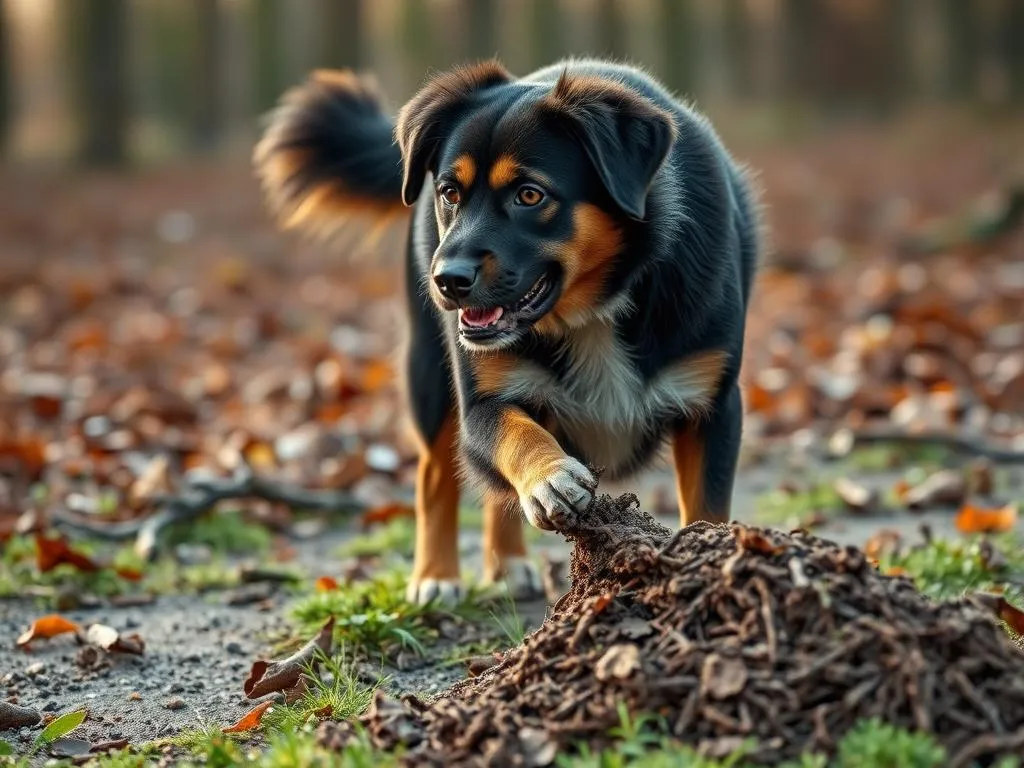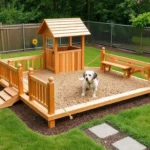
Understanding our dogs goes beyond just providing food and shelter; it involves delving into their behaviors and instincts. One such behavior that often puzzles dog owners is the kicking motion some dogs exhibit after they do their business. This article explores the reasons behind why dogs kick after they poop, offering insights that can enhance your relationship with your furry friend.
The Behavior of Kicking After Pooping
What Does It Mean?
The act of kicking after pooping is a common behavior observed in many dogs. It typically involves the dog using its hind legs to scratch or kick the ground after finishing its bowel movement. While many people might interpret this as an odd quirk, there’s more to it than meets the eye.
This behavior is often misconstrued as a sign of a dog being overly excited or perhaps even trying to cover its waste. However, the reality is that this action has deeper roots tied to instinctual behaviors and communication among dogs.
Types of Kicking
Not all kicking is created equal. Some dogs may kick with their back legs, while others may use their front paws. The style of kicking can vary significantly based on the dog’s breed, size, and individual personality. For instance, a small Chihuahua may exhibit a dainty kick, while a large German Shepherd might kick with more force and enthusiasm.
Understanding these differences can provide insights into your dog’s unique personality and instincts.
Reasons Dogs Kick After They Poop
Instinctual Behaviors
Dogs are descendants of wild canines, and many of their behaviors can be traced back to their ancestry. Kicking after pooping is thought to be an instinctual behavior. In the wild, canines kick the ground after eliminating to spread their scent. This serves two primary purposes: marking territory and communicating with other dogs.
The act of kicking scatters their scent in the surrounding area, which signals to other dogs that the territory is occupied. It’s a way of saying, “I was here!” and helps with social dynamics among canines.
Physical Reasons
Beyond instinctual behaviors, there are physical reasons for why dogs kick after they poop. Kicking can act as a way for dogs to stretch their muscles after squatting. Just like humans might stretch or shake their limbs after sitting for a while, dogs may engage in this behavior to relieve tension in their bodies.
However, there can also be health-related issues at play. If a dog seems excessively uncomfortable while kicking, it could indicate irritation or discomfort in their anal region, possibly due to issues like worms or skin irritations. Therefore, it’s essential to monitor the frequency and intensity of this behavior.
Social Communication
Kicking after pooping is not just about territory; it can also serve as a form of social communication. Dogs are incredibly social animals, and they rely heavily on body language and scent to convey messages to one another.
When a dog kicks after pooping, it may be sending signals to other dogs in the area about its presence and status. This behavior can also be a form of non-verbal communication, as it captures attention and potentially invites interaction from nearby canines.
The Science Behind the Behavior
Biological Perspective
To fully appreciate why dogs kick after they poop, it’s important to understand their olfactory system. Dogs have a highly developed sense of smell, and their noses are equipped with millions of scent receptors. This keen sense of smell plays a crucial role in how they interact with their environment.
When dogs kick, they are not just spreading their scent; they are also engaging with the scent of the ground. The act of kicking can disperse their scent particles, making it more potent and recognizable to other dogs who may come across the area later.
Behavioral Studies
Numerous studies have been conducted to understand canine behavior better. Research indicates that the kicking action serves multiple purposes, including marking territory and communicating social status among dogs. Dog trainers and behaviorists often emphasize the importance of understanding these actions as they can provide insights into a dog’s mental state and emotional wellbeing.
One notable study highlighted that dogs that exhibit a strong kicking behavior after pooping tend to engage more in social interactions with other dogs, which further emphasizes the role of this behavior in canine communication.
When to Be Concerned
Normal vs. Abnormal Behavior
While kicking after pooping is generally considered a normal behavior, there are instances when it may signal something more concerning. If your dog kicks excessively or seems to be in pain while doing so, it could be a sign of discomfort or health issues.
Look for signs such as:
- Frequent kicking after every bowel movement
- Whining or vocalizing during the act
- Scooting or dragging their rear end on the ground
- Signs of distress or reluctance to eliminate
These behaviors could indicate underlying issues that need to be addressed.
Consulting a Veterinarian
If you notice any abnormal kicking behavior or if your dog shows signs of discomfort, it’s crucial to consult a veterinarian. They can perform a thorough examination to determine if there are any health concerns at play, such as infections, allergies, or gastrointestinal issues. Early intervention can often lead to better outcomes and ensure your dog’s health and comfort.
Tips for Dog Owners
Understanding Your Dog’s Behavior
One of the most beneficial things you can do as a dog owner is to observe your dog’s habits and patterns closely. Each dog has its own unique behaviors, and understanding these can enhance your bond with them. Keeping a journal of your dog’s kicking behavior, along with other habits, can help you notice any changes over time.
Creating a Comfortable Environment
A clean and comfortable outdoor space for your dog is essential. Ensure that your yard or the area where your dog eliminates is free from irritants or hazards. Regularly clean up waste to maintain a pleasant environment and encourage your dog to feel secure in their territory.
Additionally, scheduling regular vet check-ups is vital. Routine examinations can help catch any potential health problems early on, contributing to your dog’s overall well-being.
Training and Socialization
Training and socialization play a significant role in shaping your dog’s behavior. Positive reinforcement techniques can help encourage good habits while reducing unwanted behaviors. Socializing your dog with other pets is also crucial, as it helps them learn appropriate ways to interact with their peers.
Consider enrolling in dog training classes or community programs that focus on positive reinforcement methods. These programs can provide valuable tools to help you understand and manage your dog’s behaviors effectively.
Conclusion
Understanding why dogs kick after they poop can shed light on a fascinating aspect of canine behavior. This instinctual action serves multiple purposes, from marking territory to communicating with other dogs. By observing your dog’s habits and ensuring a comfortable environment, you can enhance your relationship with your furry friend.
Ultimately, every dog is unique, and appreciating their individual quirks can deepen the bond you share. Whether it’s a gentle kick or an enthusiastic flurry of paws, these behaviors remind us of the rich tapestry of canine life. Enjoy the journey of discovering and understanding your dog’s unique personality!









